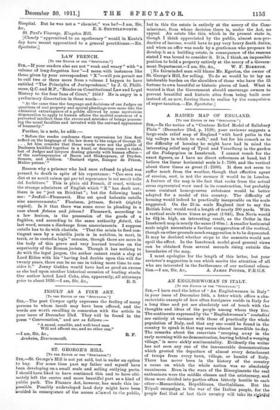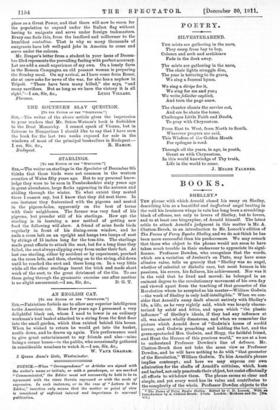AN ENGLISHWOMAN IN ITALY.
[To THE EDITOR OF THE "SIERT110t?l Srn,—I have read the letter of "An Englishwoman in Italy" in your issue of December 16th, a letter which offers a cha- racteristic example of how often foreigners reside in Italy for a long time and yet are absolutely out of touch with the thoughts and ideas of the people among whom they live. The sentiments expressed by the " Englishwoman's " contadini are entirely at variance with those of practically the whole population of Italy, and that any one could be found in the country to speak in that way seems almost incredible to-day. The remarks about the reservists "creeping away in the early morning with no demonstration, leaving behind a weeping village," is mere sickly sentimentality. Evidently the writer has not seen any one of the innumerable demonstrations which greeted the departure of almost every detachment of troops from every town, village, or hamlet of Italy. There has never been in the history of the country a cause on which the whole nation was so absolutely unanimous. Even in the wars of the Risorgimento the real enthusiasts were the middle classes and the aristocracy, and these were divided into parties often bitterly hostile to each other—Monarchists, Republicans, Garibaldians. But the Tripoli campaign is the war of the Italian people, for the people feel that at last their country will take its rightful place as a Great Power, and that there will now be room for the population to expand under the Italian flag without having to emigrate and serve under foreign taskmasters. Every one feels this, from the landlord and millowner to the humblest contadino. That is why so many thousands of emigrants have left well-paid jobs in America to come and serve under the colours.
Mr. Draper's letter from a student in your issue of Decem- ber 23rd represents the prevailing feeling with perfect accuracy. Let me add a small experience of my own. On a lonely farm in the Roman Campagna an old peasant woman is preparing the Sunday meal. On my arrival, as I have come from Rome, she at once asks for news of the war, for she has a nephew in Tripoli. "There have been many killed," she says, "and many sacrifices. But as long as we have the victory it is all







































 Previous page
Previous page